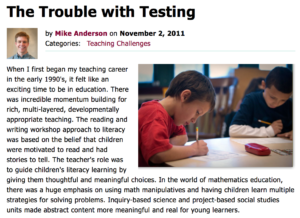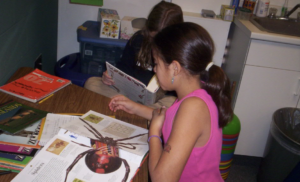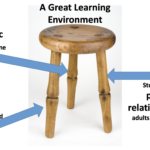The Trouble with Testing
 When I first began my teaching career in the early 1990’s, it felt like an exciting time to be in education. There was incredible momentum building for rich, multi-layered, developmentally appropriate teaching. The reading and writing workshop approach to literacy was based on the belief that children were motivated to read and had stories to tell. The teacher’s role was to guide children’s literacy learning by giving them thoughtful and meaningful choices. In the world of mathematics education, there was a huge emphasis on using math manipulatives and having children learn multiple strategies for solving problems. Inquiry-based science and project-based social studies units made abstract content more meaningful and real for young learners.Blending these exciting teaching and learning strategies led to incredible integrated, cross-discipline projects that were fun, rigorous, and that helped children learn how to work together effectively. For example, a fifth grade colleague of mine put together a unit about Westward Expansion where students read books and websites, wrote in multiple genres (poetry, historical fiction, letters, etc.), did independent research projects on a topic of their choice, and recreated the Lewis and Clark adventure on the school playground for all of the school to visit (complete with guided tours). Students were highly engaged in this work, learned an incredible amount of history, and also practiced skills such as cooperation, creativity, and persistence.
When I first began my teaching career in the early 1990’s, it felt like an exciting time to be in education. There was incredible momentum building for rich, multi-layered, developmentally appropriate teaching. The reading and writing workshop approach to literacy was based on the belief that children were motivated to read and had stories to tell. The teacher’s role was to guide children’s literacy learning by giving them thoughtful and meaningful choices. In the world of mathematics education, there was a huge emphasis on using math manipulatives and having children learn multiple strategies for solving problems. Inquiry-based science and project-based social studies units made abstract content more meaningful and real for young learners.Blending these exciting teaching and learning strategies led to incredible integrated, cross-discipline projects that were fun, rigorous, and that helped children learn how to work together effectively. For example, a fifth grade colleague of mine put together a unit about Westward Expansion where students read books and websites, wrote in multiple genres (poetry, historical fiction, letters, etc.), did independent research projects on a topic of their choice, and recreated the Lewis and Clark adventure on the school playground for all of the school to visit (complete with guided tours). Students were highly engaged in this work, learned an incredible amount of history, and also practiced skills such as cooperation, creativity, and persistence.
With great sadness, I have seen incredible high-level and rigorous work such as this fall by the wayside in schools all across the country over the past decade. As I travel to schools in Virginia, Montana, Georgia, Massachusetts, California, and many other states, I hear a similar lament over and over again: “I used to do such great projects with my students: cooking, research projects, historical field trips, plays . . . I can’t do any of that any more. I have to stick to my district’s pacing guides, and we have to get ready for The Tests.”
Over the past decade, standardized testing has assumed an overly prominent role in public schools across the country. No Child Left Behind was an attempt to help all children receive an adequate education, but its overreliance on testing as a method for assessing student learning has in fact, lowered academic standards in significant ways.
One big problem with testing is that the tests themselves are limiting. Some skills can be assessed using paper-pencil tests, but many cannot. Computation, grammar, formulaic writing, and basic reading comprehension are all examples of testable skills, and they form the bulk of typical standardized tests. There are many other skills that are much harder to test, and arguably, much more important for children to develop. Creativity, empathy, perseverance, and self-motivation are just a few that are being neglected.
In a recent blog article for The Harvard Business Review, Adam Richardson suggests that schools spend more time focusing on what he calls “The Four C’s” of learning: Creativity, Complexity, Curiosity, and Collaboration. He argues that these are skills that students will need in the marketplace, and that they are missing out on developing them because of an overemphasis on testing in schools. I couldn’t agree more. The skills involved in “The Four C’s” are just what we seem to be losing as we move away from project-based, hands-on, developmentally appropriate curricula.
November 2, 2011, Responsive Classroom Blog, Original Link: https://www.responsiveclassroom.org/blog/trouble-testing
Mike Anderson is an education consultant who leads great learning throughout the United States and beyond. He is an award winning teacher and the author of many books. You can follow him on Twitter at @balancedteacher.




